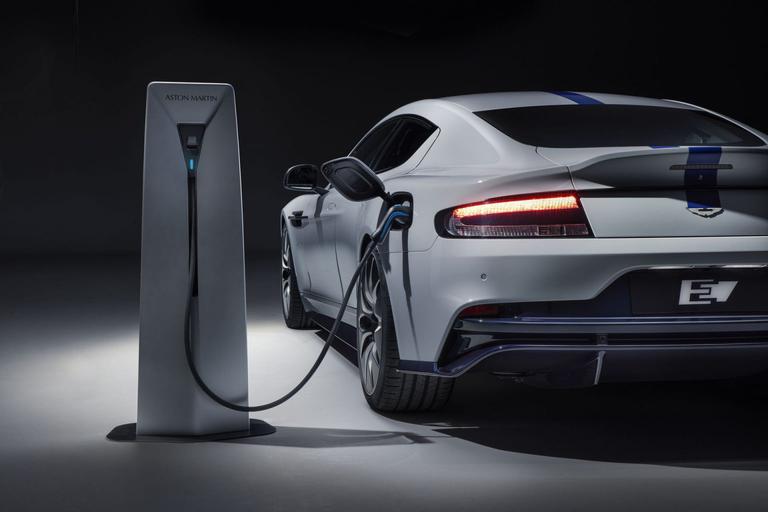HomeIndustryThis is how supercar and luxury car brands will be electrified
Ferrari, McLaren, Aston Martin, Lamborghini, Bentley, Rolls-Royce... They all have in common that, in addition to the fact that their cars are very expensive, they must be electrified.
Alex Soler
Electrification for supercar and luxury vehicle brands is an even more sensitive issue than it is for mainstream firms. Proof of this is that manufacturers such as McLaren or Lamborghini have a hard time imagining one of their cars with a 100% electric drive. However, the direction that the automotive industry has taken, which seems to bet everything on plugs, also forced by the rigorous restrictions coming from the political class, imposes that these brands must be transformed sooner rather than later.
In the general market there are not too many problems beyond the need to make huge investments to adapt to this new reality, Ford, in Europe, Volvo, Jaguar... There are already several brands that have set a specific date to definitively stop combustion . Even Cupra or Alpine, sports car companies, will become 100% electric brands. The first is already preparing the arrival of the Tavascan and the propulsion version of the UrbanRebel, both electric, in the coming years, while the second has already confirmed a new electric model for 2025 that will be produced together with Lotus, which already has an electric one, at the French plant in Dieppe.

Even Porsche, which is the company that is probably closest to the model of brands like Ferrari or Lamborghini, already has the Taycan, and its successive versions, an electric that shows that sportsmanship and electricity are not as close as it might seem. However, supercar brands, just like the luxurious Bentley or Rolls-Royce, have built their history around incredible engines, such as Lamborghini's naturally aspirated V12, Aston Martin's twin-turbo V12 or Ferrari's twin-turbo V8.
Plugged in supercars
It seems that hybridization is the path that most supercar brands have decided to follow, waiting before daring with total electrification. The example is McLaren, which was one of the first brands to bet on hybridization in P1, although in terms of performance. From the brand, Ruth Nic Aoidh, executive director of purchasing, admitted to Reuters that “we could probably do an electric car tomorrow, but this would kill all the attributes that make a McLaren a McLaren”. After presenting the Artura, its latest supercar, which is already electrified thanks to a plug-in hybrid drive, the British firm confirmed that, from 2026, all its vehicles will be hybrids. A half step towards total electrification, which they still do not know how to face due to the much higher weight of electric cars.
Ferrari seems to want to follow the same path, which has already mounted hybrid engines in the LaFerrari or in the SF90 Stradale. For the 'Cavallino Rampante', however, the path is more diffuse and they do not prefer to set a date for its total electrification. Louis Camilleri, former CEO of the brand, who resigned at the end of 2020, went so far as to say that 60% of his cars would be hybrids by 2022, but then he was quick to attack the European authorities for their severity and even claimed that the brand it would never be 100% electric. "I don't think I see it," he said then after defending that "if you drive a Ferrari with a V12 engine for about 3,000 kilometers a year, you will generate fewer emissions than a small car that circulates every day." One of its latest vehicles presented, the 296 GTB, is a plug-in hybrid, and it seems that the Purosangue, the SUV that should arrive this year, will also bet on this route. For its first electric car, Ferrari confirmed last year that it is aiming to launch it in 2025.
Just 32 kilometers from Maranello, in Sant'Agata Bolognese, Lamborghini has recently expanded the details of its plan to go electrified. As announced by Stephan Winkelmann, CEO of Lamborghini, his strategy, baptized as Direzione Cor Tauri, is already defined and will consist of three phases. First of all, during this year Lamborghini will focus on paying homage to the combustion engine, launching models that reflect the period of success experienced by the brand. The second phase, which will run until the end of 2024, will be the hybrid transition of the brand, with the first hybrid series production vehicle being presented in 2023. By the end of 2024, according to Winkelmann, the entire Lamborghini range will be electrified, always using hybridization to improve the performance and dynamism of its vehicles. To do this, it will invest 1,500 million euros over the next four years. At the end of this phase, the CO2 emissions of your range will have been reduced by 50%. Finally, Lamborghini will spend the second half of the decade developing its first electric car. This same month of January, the firm of the bull has confirmed that its first electric car will be a four-seater coupé SUV and that it will arrive in 2030.
Aston Martin also seems to have it quite clear. In the words of Lawrence Stroll, president and majority shareholder of Aston Martin, the brand's first 100% electric cars, beyond the experiment that turned out to be the RapidE, will arrive in 2025, a sports car that will be produced in Gaydon and an SUV that, as the DBX, will be assembled in St Athan, Wales. This same year, a microhybrid version of the DBX will be launched in combination with the V8 and twin turbo that it mounts, and that AMG provides to the British firm. In 2023, the crossover will receive a plug-in hybrid version. After the first electric ones, Aston Martin's electrified offensive will continue so that, according to Tobias Moers, CEO of the brand, 95% of its sales in 2030 correspond to electrified, 50% electric and 45% hybrid.
electrified luxury
The dilemma of facing a lifetime dedicated to the development of the most powerful gasoline engines in the world is not faced by the most luxurious brands, such as Bentley and Rolls-Royce. So much so, that the former has already set a date for the end of combustion in its imposing vehicles, the year 2030. Adrian Hallmark, its CEO, only left open the possibility of combustion in the so-called continuation models, which honor its classic cars , although with the use of synthetic fuels. The first electric car with the Bentley logo will hit the road for the first time in 2025. Although no further details have been given beyond the investment of 2,500 million pounds (3,000 million euros) that the Crewe company will make in sustainability until 2030, it is expected to incorporate advanced autonomous driving functions developed together with Audi. The electric Bentley will be produced at the brand's plant in Crewe.
Finally, Rolls-Royce has decided to follow the same path as its British rival. The BMW Group brand has already confirmed that it is working on a new vehicle, which it has called Specter, which will become its first electric vehicle and will hit the market in 2023. Despite admitting that they have already started developing it, Torsten Mueller-Oetvoes , its CEO, promised that it will be a 100% Rolls-Royce vehicle, that is, that it meets the quality, luxury and performance standards of the prestigious BMW Group banner, and that it will become the first of many, since, like Bentley, the brand will also stop selling combustion cars in 2030.
Also »BMW 2 Series Active Tourer 2021: more sporty, technological and functional



